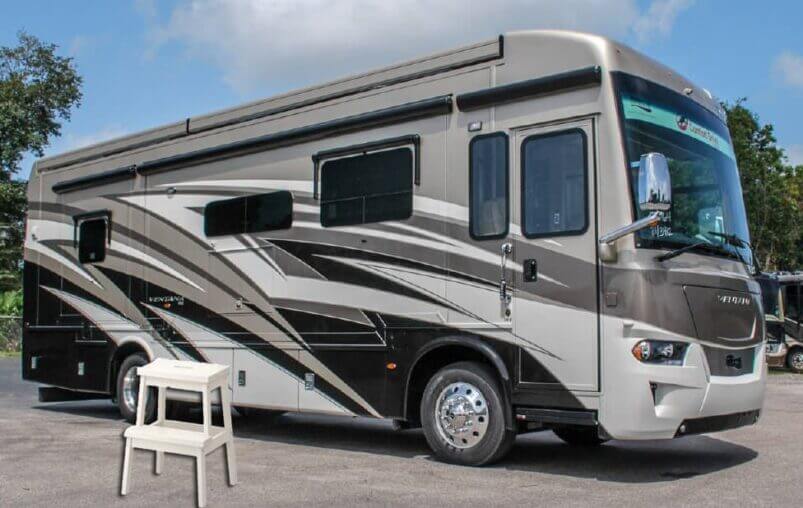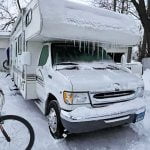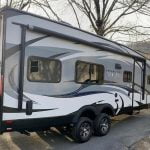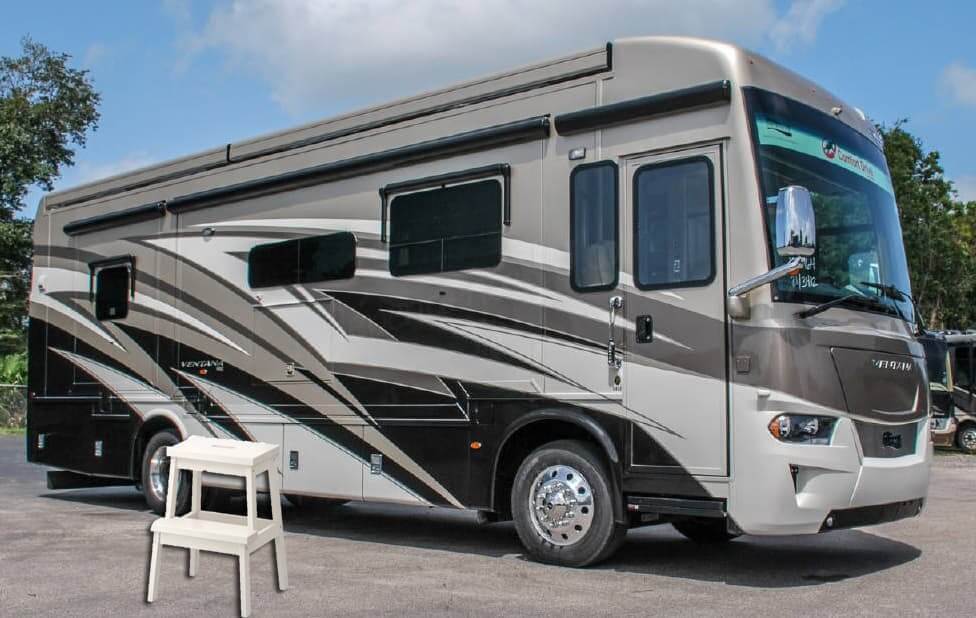
What’s the difference between a motorhome and an RV? Are trailer RVs bigger than travel trailers? And what’s the deal with fifth wheels and truck campers? There are so many different types of RVs available on the market that it can be hard to tell which one is right for you.
That’s why we put together this overview of the most common types of RVs and their pros and cons so you can decide which one will work best for your needs!
RVs are available at various prices, sizes, styles, and shapes, each with its unique advantages.
It’s lovely to see newcomers discovering the different RV types and determining which is best suited to their life requirements.
Motorhomes, fifth wheels, and also camper trailers are there for your choice, but what is the right way when one starts to decide on RV types?
What are the different types of RVs? The initial step is to understand that there are two broad categories of Recreational vehicles: tugs and motorized.
Motorized RV Types
Class A, Class B, and Class C are the main types of motorized recreational vehicles you’ll see on the road today.
In short, Class A motorhomes have the grand design and biggest engines, while class B’s (also known as campers) are the smallest camper, then class C RVs in the middle.
These units have the “cabin” and living space all enclosed under the same roof.
Towable RV Types
These are rolling vehicles (commonly described as “trailers”) created to be drawn by one more car. The kind of automobile needed for towing is identified by the weight and size of the trailer. After staying in a camping area, the owner/tenant can separate their trailer and use the automobile for driving needs. There are 5 primary types of trailers: pop-up trailers, fifth wheels, truck campers, travel trailers, and toy haulers.
While you can get a clear idea of what a towable caravan is, you may be surprised by the variations that exist in the market today. This makes it an excellent choice for large families or those who want to camp with large groups. Many fifth-wheel RV users will park their RV at a campground and drive the tug (pulling) vehicle for daily travel. As with any towed vehicle, the towing vehicle must be classified in such a way as to withstand the weight of the vehicle and its contents.
The following mobile vehicle types are organized according to the motorized or towable categories.
Motorized RVs with Classes A, B, and C
Class A Motorhome:
Class A RV motor homes are built on a van chassis, a commercial truck chassis, or a commercial bus chassis.
There are two types of class A motorhomes: gas and diesel. Each type offers different features, but diesel engines generally have a longer service life and are more durable than their gasoline counterparts.
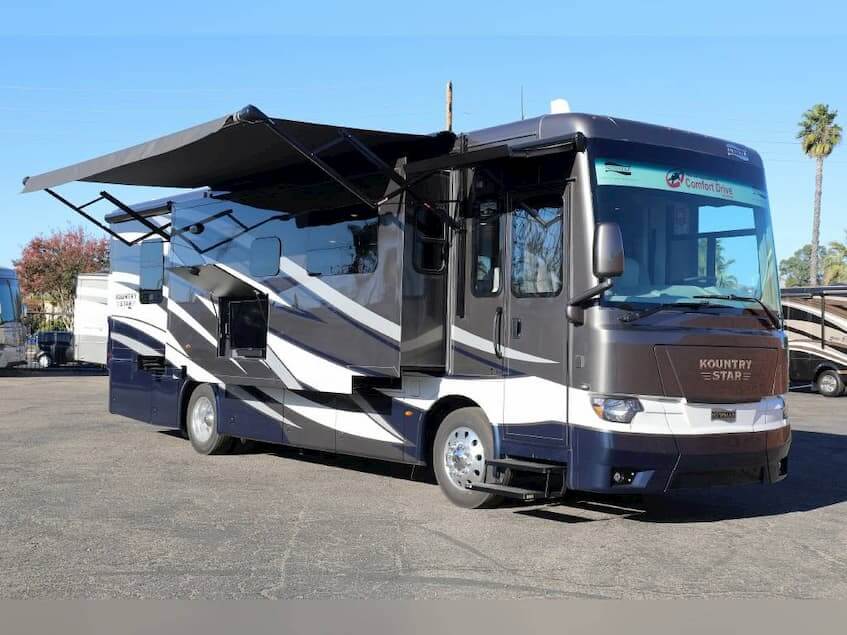
When buying a class A motorhome, you should decide if you want to purchase a gasoline-powered RV or one that runs on diesel fuel. Diesel is more expensive than gasoline, but it has more torque and horsepower, which means it can easily tow a trailer.
Gasoline-powered motorhomes do not have much power, offering better fuel economy than their diesel counterparts. The main advantage of purchasing a Class A motorhome is larger than other recreational vehicles.
These RVs can seat up to nine people comfortably, and many models include space for storage underneath the bed where mattresses can be placed for additional sleeping space when needed.
They are generally longer than travel trailers and fifth wheels and often feature multiple slide-outs to maximize living space. They also come equipped with air conditioning units so occupants will always feel comfortable inside.
Some owners use these RVs for year-round living, while others prefer them only for vacations.
Either way, there is no denying that owning a Class A motorhome opens up doors to a wide range of travel opportunities because of its spacious design and sturdy build quality.
Class B Motorhome :
The class B RV is a semi-classical camper van available in diesel and gas models. These vehicles are much more mobile than most campers but have less storage capacity.
Most models feature four wheels for ease in driving and stabilizers to keep them safe in off-road conditions. Some also come with two slides for added room inside, while others are just one long extended unit.
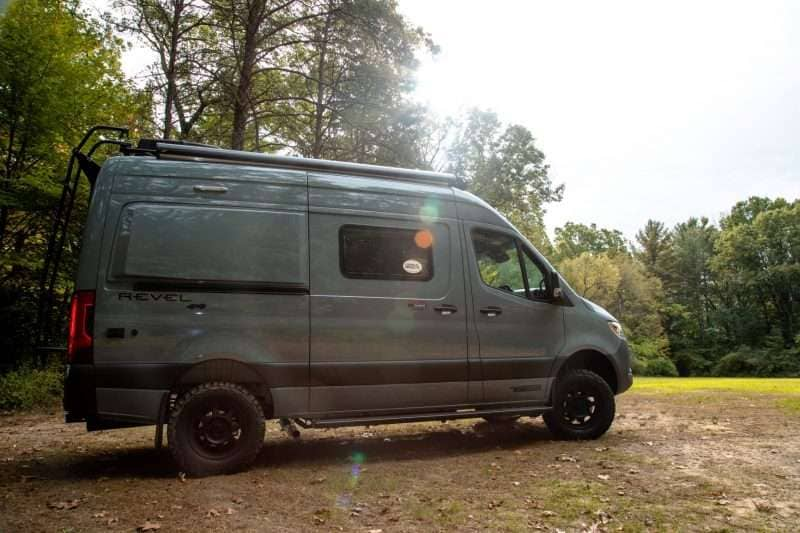
In addition, these RV types usually offer a kitchenette (or full kitchen) and an indoor bathroom and shower.
While these units might not be ideal for those who need to carry large amounts of gear or supplies, they offer great amenities without sacrificing too much space.
Class C Motorhome:
RV motorhomes are classified by size; a Class C RV is about 18 feet long and, depending on its amenities, can carry up to four people.
Class C motorhomes are known as cabover because their cab sits above where one would drive a truck.
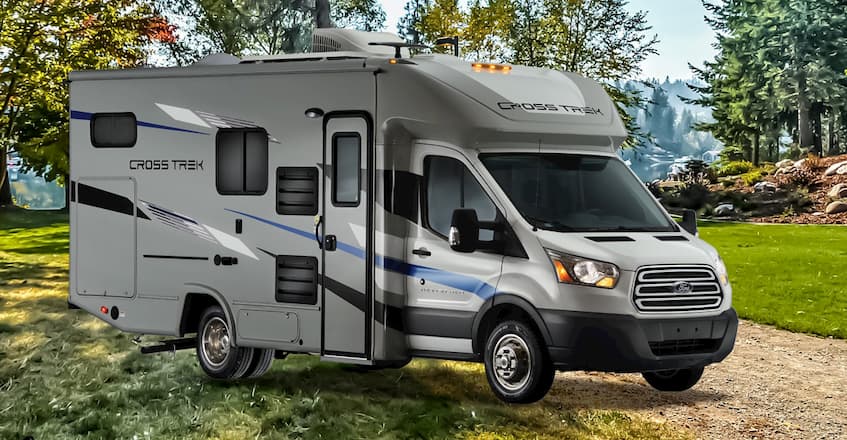
With a trailer hitch in place, it’s also possible to pull a small travel trailer with a Class C motorhome.
The most remarkable attribute that distinguishes Class C from Class A motorhomes is that they have a noteworthy feature that distinguishes them from Class A motorhomes: they’re relatively inexpensive.
This allows many more people to take advantage of owning an RV without breaking their bank accounts. The other significant benefit of owning a Class C over a larger model is maneuverability.
Towable RV Types
Travel trailers
Of all RV types, travel trailers are probably what most people think of when they imagine an RV.
They’re small and boxy, have flat or high roofs, and usually house a single slide-out (which takes up almost an entire side) and a rear door.
Travel trailers contain a range of layouts, from essential to elegant. There are self-catering units comprising a living room, a bedroom, a bathroom, and a kitchen.
Travel trailers may also be built with sliders.
Travel trailers are typically less expensive than other types of RVs, too.
However, they’re not as luxurious.
A travel trailer might be right for you if you’re looking for something compact, simple, and easy to drive around in one trip from point A to point B.
Brands such as Airstream motorhome and trailer styles, such as tears, are integrated under the umbrella of the term travel trailer.
The RV trailer industry continues to evolve in the design plans of travel trailers.
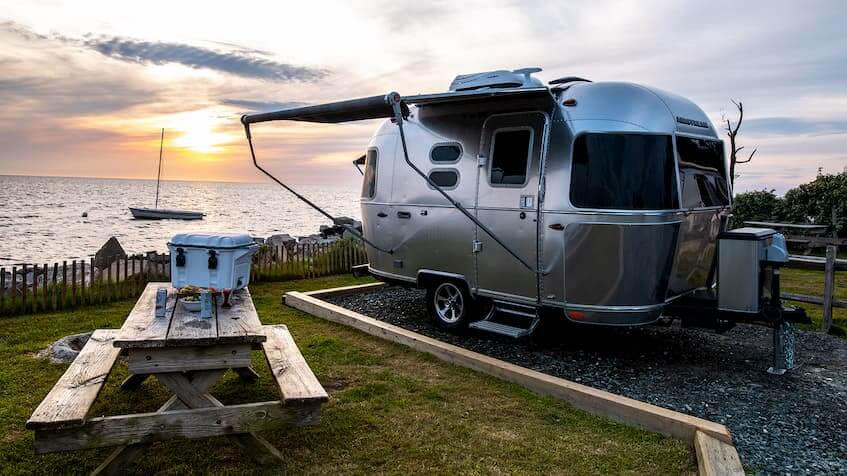
Many companies present hybrid designs that comprise extensible sections instead of rigid lateral sliding outputs.
These folding parts are constructed from sturdy cloth like a camping tent, providing more square meters to the section when it expands, and reducing the section’s load so that it is possible to tow by using a lighter vehicle.
Fifth Wheels
When you think RV, you probably picture a fifth wheel trailer.
This type of trailer is built to stay attached to your tow vehicle, except when parked.
Fifth wheels are incredibly spacious, providing more than enough room for you and your family.
However, they are also relatively heavy and must be towed by a pickup truck or SUV.
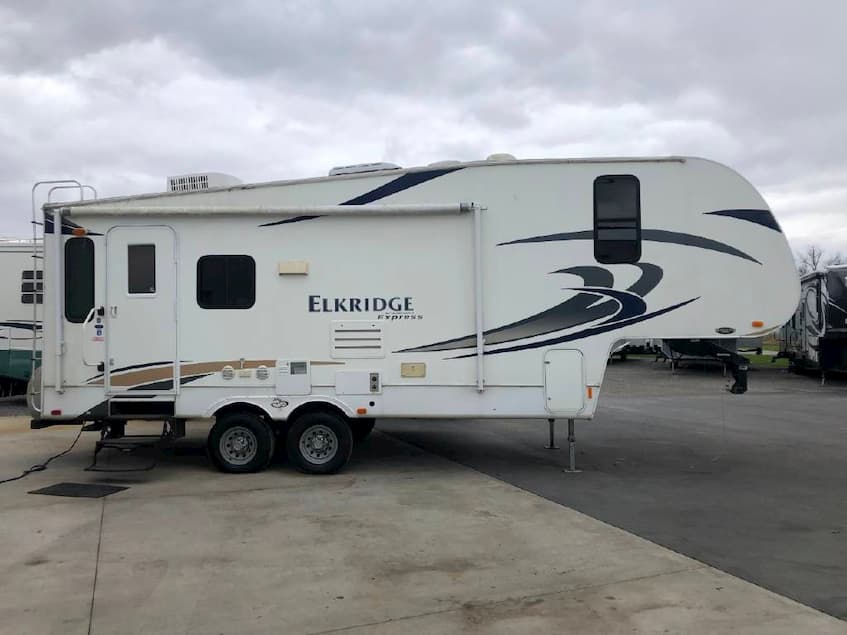
Because fifth wheels require special training and a specific type of towing equipment, most states restrict their use to drivers who have taken specialized training courses.
The biggest type of towed Recreational Vehicle is the fifth wheel. It is quickly recognizable for two factors:
- They are towed through a van. A standard truck is liked when you pull any of these giants. The fifth wheel trailer is fixed with the help of a special hitch located on the truck’s bed.
- Fifth wheels also have a distinctive front projection, sometimes referred to as “gooseneck.” The elevated ahead area floats above the truck bed and includes the bedroom or living room.
RV manufacturers will increase the living space with several sliders.
Like most RV different types, the level of quality, comfort, sophistication, and RV parts in the design varies.
Fifth wheels can be equipped with the desired level of luxury, automated technology, and household appliances.
Toy Haulers Trailers
Toy hauler campers, or sports utility vehicles, are a subcategory of travel trailers and fifth wheels. Some choose this type of RV trailer because it is constructed with a garage to take all sorts of camping adventures.
A toy holder can be a travel trailer, a fifth wheel, or even a motorhome with each attribute.
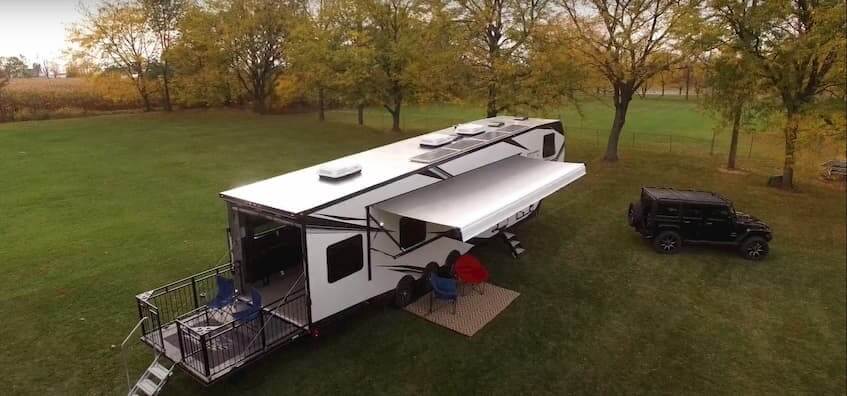
Even if you don’t plan to carry four-wheeled vehicles or bicycles, many toy holder fans love this open space’s endless space and possibilities.
Toys comprise golf carts, motorcycles, kayaks, quads, snowmobiles, etc.
The toy conveyor’s rear rotates entirely downwards and becomes a ramp for loading and unloading equipment and vehicles outdoors and storage space.
Manufacturers offer folding sleeping options in the garage, including beds that descend from the ceiling by pressing a button and a separate TV and entertainment center.
The garage area is reinforced by water and oil-resistant floors, tie fasteners, and protective wall panels.
Pop-up Trailers
Pop-ups have been the constant accessory on family camping because of their affordable price.
Also, they are light, which means they can often be towed by the family vehicle.
These towable caravans make camping more comfortable, and they are available with a variety of options.
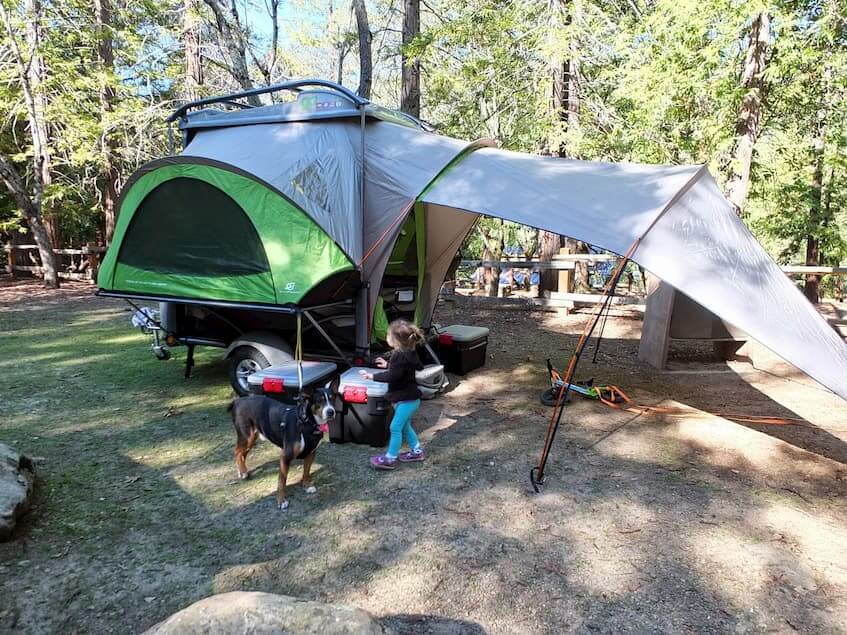
Pop-up campers, also known as folding camper vans, have a base similar to a cargo trailer and a sturdy tarpaulin top.
Several hybrid versions have rigid walls rather than cloth.
This alternate offers better insulation. Emerging campers are lifted by utilizing a manual lever or a motorized system.
The pop-up folds up to a portable system 4 feet higher and pulls promptly as it is lightweight and low profile.
Pop-up campers are equipped with less or no intricacy in residential home appliances and systems than other Recreational vehicles are. Also, they offer an excellent intro to learning more about how Recreational vehicles function.
The main body is lowered during travel which significantly reduces the total height. This makes towing easier and more fuel-efficient.
The cheapest tugs still offer enough space for 4-8 individuals to enjoy resting locations, kitchen, and living room.
Not all versions are created with a shower room; however, it typically contains a shower/WC combination to the maximum if they are equipped with it.
This type of RV is perfect for those who are new to RV-ing, as they ensure a smooth transition between the tent, towing, and the use of an RV.
Truck Campers
Truck campers, the small devices, might have a load that expands above the cab and might also possess slide-outs or canvass expansions for extra clearance.
The secret is to have a lorry fated to carry the weight when it concerns those campers.
Durable vehicles are required under many circumstances.
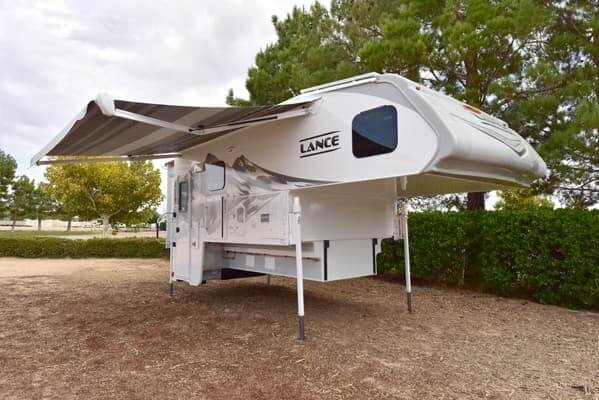
A truck camper is also described as slide-ins or cab-overs. They can be equipped for preparing food to eat and even sleep.
They can additionally have a damp bathroom or shower/toilet combination.

